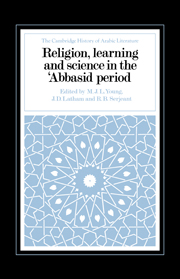Book contents
- Frontmatter
- Epigraph
- Contents
- List of plates
- Editorial preface
- List of abbreviations
- Map Literary, political and religious centres in the ʿAbbasid period
- 1 Sunnī theology
- 2 Shīʿī theological literature
- 3 Ibāḍī theological literature
- 4 Quranic exegesis
- 5 The prose literature of Ṣufism
- 6 Philosophical literature
- 7 Arabic lexicography
- 8 Arabic grammar
- 9 Islamic legal literature
- 10 Administrative literature
- 11 Arabic biographical writing
- 12 History and historians
- 13 Faṭimid history and historians
- 14 Mathematics and applied science
- 15 Astronomy
- 16 Astrology
- 17 Geographical and navigational literature
- 18 The literature of Arabic alchemy
- 19 Arabic medical literature
- 20 Al-Kindī
- 21 Al-Rāzī
- 22 Al-Fārābī
- 23 Ibn Sīnā
- 24 Al-Bīrūnī and the sciences of his time
- 25 Al-Ghazālī
- 26 Christian Arabic literature in the ʿAbbasid period
- 27 Judaeo-Arabic literature
- 28 The translation of Greek materials into Arabic
- 29 Didactic verse
- Glossary
- Bibliography
- Index
5 - The prose literature of Ṣufism
Published online by Cambridge University Press: 05 July 2014
- Frontmatter
- Epigraph
- Contents
- List of plates
- Editorial preface
- List of abbreviations
- Map Literary, political and religious centres in the ʿAbbasid period
- 1 Sunnī theology
- 2 Shīʿī theological literature
- 3 Ibāḍī theological literature
- 4 Quranic exegesis
- 5 The prose literature of Ṣufism
- 6 Philosophical literature
- 7 Arabic lexicography
- 8 Arabic grammar
- 9 Islamic legal literature
- 10 Administrative literature
- 11 Arabic biographical writing
- 12 History and historians
- 13 Faṭimid history and historians
- 14 Mathematics and applied science
- 15 Astronomy
- 16 Astrology
- 17 Geographical and navigational literature
- 18 The literature of Arabic alchemy
- 19 Arabic medical literature
- 20 Al-Kindī
- 21 Al-Rāzī
- 22 Al-Fārābī
- 23 Ibn Sīnā
- 24 Al-Bīrūnī and the sciences of his time
- 25 Al-Ghazālī
- 26 Christian Arabic literature in the ʿAbbasid period
- 27 Judaeo-Arabic literature
- 28 The translation of Greek materials into Arabic
- 29 Didactic verse
- Glossary
- Bibliography
- Index
Summary
The prose literature of Islamic mysticism, or Ṣufism, during the ʿAbbasid era is rich and varied. Distinct accomplishments can be credited to Ṣūfī writers who often did not shun the use of prevailing genres and styles of expression. In the face of criticism and pressures from the ulema, Ṣūfī authors often resorted to the oblique and enigmatic as tools of literary expression and ideological articulation. Beliefs were often couched in symbolical and allegorical references, and so thoroughly camouflaged at times that authors in the later centuries found it necessary to write their own commentaries.
Basically Ṣūfī writers were not particularly innovative with regard to prose categories. They favoured definitive and descriptive works, guidance and reference manuals, epistolary and instructional treatises and biographies and hagiographies. Their themes tended to explain and moralize, with heavy stress on the exemplary. Didactic techniques seem to govern most aspects of their writings, particularly in the later stages when instructing and guiding novices required much wisdom and exemplification.
On the defensive during much of the earlier centuries, Ṣufism generated a wealth of polemical and introspective literature. To enlist sympathy for their cause, Ṣūfīs developed a remarkable capacity for communication. In contriving the means, they contributed not only to literary norms but to the language as well, in the form of direct facile expressions which, in the long run, reduced the tendency toward affectation, subtlety and exaggeration.
- Type
- Chapter
- Information
- Religion, Learning and Science in the 'Abbasid Period , pp. 56 - 75Publisher: Cambridge University PressPrint publication year: 1990



